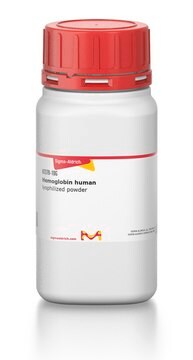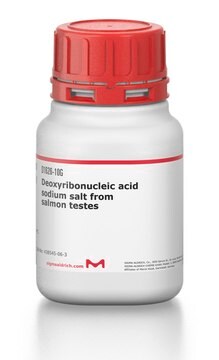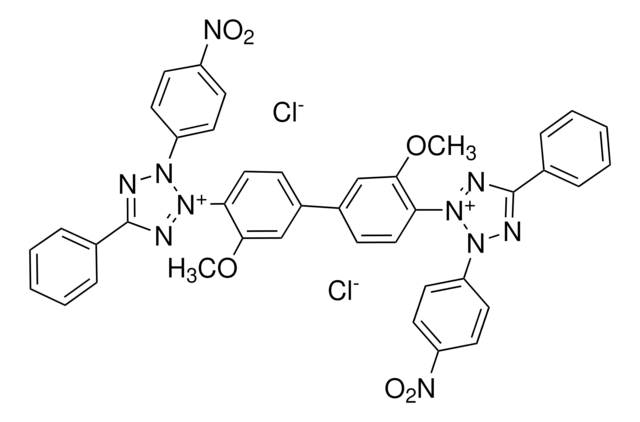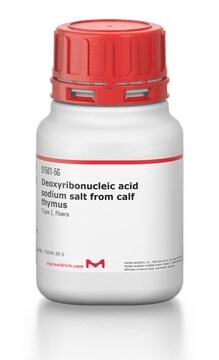Alle Fotos(1)
Wichtige Dokumente
T6632
Thymidinphosphorylase, rekombinant aus E. coli
recombinant, expressed in E. coli, buffered aqueous solution, ≥900 units/mL, 0.2 μm filtered
Synonym(e):
Thymidin:Orthophosphatdesoxy-D-ribosyltransferase
Anmeldenzur Ansicht organisationsspezifischer und vertraglich vereinbarter Preise
Alle Fotos(1)
About This Item
CAS-Nummer:
MDL-Nummer:
UNSPSC-Code:
12352204
NACRES:
NA.54
Empfohlene Produkte
Rekombinant
expressed in E. coli
Qualitätsniveau
Sterilität
0.2 μm filtered
Form
buffered aqueous solution
Konzentration
≥900 units/mL
UniProt-Hinterlegungsnummer
Lagertemp.
2-8°C
Angaben zum Gen
Escherichia coli K12 ... deoA(948901)
Suchen Sie nach ähnlichen Produkten? Aufrufen Leitfaden zum Produktvergleich
Allgemeine Beschreibung
Thymidine phosphorylase inhibits vascular smooth muscle cell proliferation.
Anwendung
Thymidine phosphorylase has been used in a study to evaluate biomarkers for advanced breast cancer patients treated with capecitabine-based first-line chemotherapy. Thymidine phosphorylase has also been used in a study to investigate implications for the clinical efficacy of nucleoside analogues.
Biochem./physiol. Wirkung
Ein Enzym, das die reversible Umwandlung von Thymidin zu Thymin katalysiert. Thymidinphosphorylase ist Teil des Pyrimidinnukleosid-Salvage-Pathways. Dieser Weg ermöglicht das Wiederverwenden von Pyrimidinbasen für die Nukleotidbiosynthese, während die Pentose-1-phosphate zu Zwischenprodukten des Pentosephosphatwegs und der -glycolyse umgewandelt werden. Die E. coli-Thymidinphosphorylase hat 40 % Sequenzhomologie mit der menschlichen Sequenz, die identisch zu dem angiogenen Mittel Platelet-derived Endothelial Growth Factor ist. Das aufgereinigte E. coli-Enzym stimuliert das Wachstum von Blutgefäßen in Hühner-Chorioallantoismembran-Assays.
Einheitendefinition
One unit will convert 1.0 μmole each of thymidine and phosphate to thymine and 2-deoxyribose 1-phosphate per min at pH 7.4 at 25°C.
Physikalische Form
Solution in 0.5 M potassium phosphate containing 2 mM uracil, 0.02% sodium azide and bovine serum albumin
Angaben zur Herstellung
Cloned from E. coli and produced in overexpressing E. coli
Lagerklassenschlüssel
12 - Non Combustible Liquids
WGK
WGK 2
Flammpunkt (°F)
Not applicable
Flammpunkt (°C)
Not applicable
Persönliche Schutzausrüstung
Eyeshields, Gloves, multi-purpose combination respirator cartridge (US)
Hier finden Sie alle aktuellen Versionen:
Besitzen Sie dieses Produkt bereits?
In der Dokumentenbibliothek finden Sie die Dokumentation zu den Produkten, die Sie kürzlich erworben haben.
Domenico Ribatti et al.
Expert opinion on therapeutic targets, 16(12), 1215-1225 (2012-09-18)
Several anti-angiogenic agents have been developed and some of them have been clinically applied in the tumor therapy. Anti-angiogenic therapy faces some hurdles: inherent or acquired resistance, increased invasiveness, and lack of biomarkers. Characterization of tumor endothelial markers may help
Richard A Norman et al.
Structure (London, England : 1993), 12(1), 75-84 (2004-01-17)
Human thymidine phosphorylase (HTP), also known as platelet-derived endothelial cell growth factor (PD-ECGF), is overexpressed in certain solid tumors where it is linked to poor prognosis. HTP expression is utilized for certain chemotherapeutic strategies and is also thought to play
Alexandra Giatromanolaki et al.
Cancer biology & therapy, 13(13), 1284-1289 (2012-08-17)
Tumor-associated stroma (TAS) is not simply a supporting element for cancer cells, but plays an important role in tumor growth, invasion and metastasis. Changes on the level of stromal constituents, such as loss of Caveolin-1 and increased thymidine phosphorylase (TP)
Hong-Yun Zhao et al.
Anti-cancer drugs, 23(5), 534-542 (2012-04-07)
The aim of the present study was to investigate the gene expression of biomarkers associated with the sensitivity to fluoropyrimidine and taxanes in recurrent/advanced breast cancer patients treated with first-line capecitabine chemotherapy. We evaluated the clinicopathological/prognostic significance of thymidylate synthase
Michelle Levene et al.
Toxicological sciences : an official journal of the Society of Toxicology, 131(1), 311-324 (2012-09-15)
Erythrocyte-encapsulated thymidine phosphorylase (EE-TP) is currently under development as an enzyme replacement therapy for mitochondrial neurogastrointestinal encephalomyopathy (MNGIE), an autosomal recessive disorder caused by a deficiency of thymidine phosphorylase. The rationale for the development of EE-TP is based on the
Unser Team von Wissenschaftlern verfügt über Erfahrung in allen Forschungsbereichen einschließlich Life Science, Materialwissenschaften, chemischer Synthese, Chromatographie, Analytik und vielen mehr..
Setzen Sie sich mit dem technischen Dienst in Verbindung.







